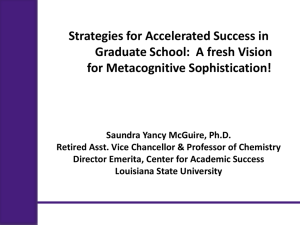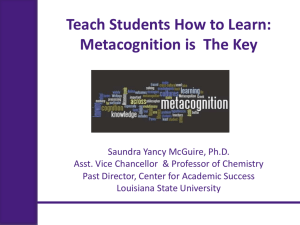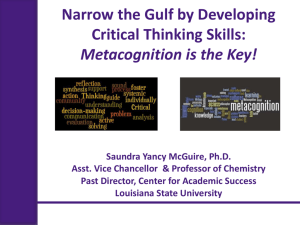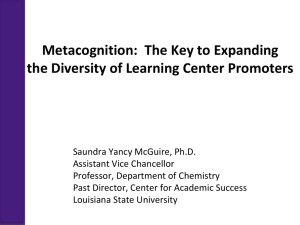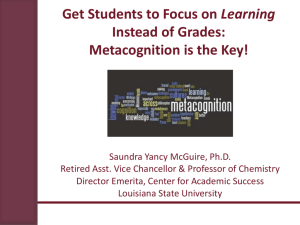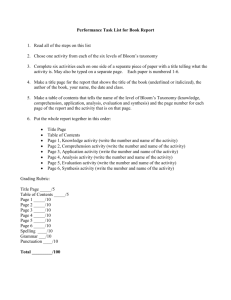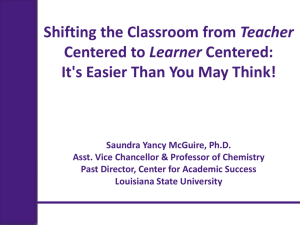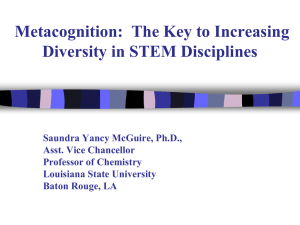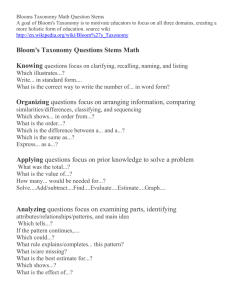how i learn - Jackson State University
advertisement
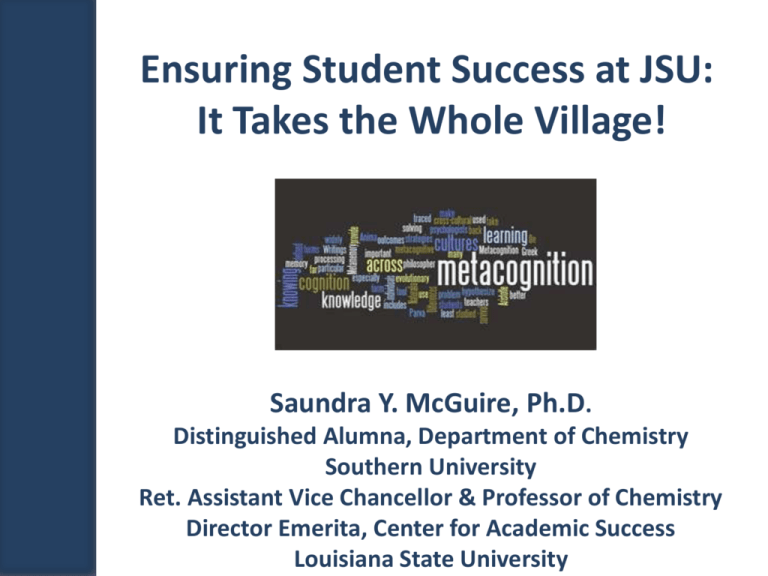
Ensuring Student Success at JSU: It Takes the Whole Village! Saundra Y. McGuire, Ph.D. Distinguished Alumna, Department of Chemistry Southern University Ret. Assistant Vice Chancellor & Professor of Chemistry Director Emerita, Center for Academic Success Louisiana State University JSU Mission Statement The University produces technologically-advanced, diverse, ethical, global leaders who think critically, address societal problems and compete effectively. JSU Vision Statement Building on its historic mission of empowering diverse students to become leaders, Jackson State University will become recognized as a challenging, yet nurturing, state-of-the-art technologicallyinfused intellectual community. Students and faculty will engage in creative research, participate in interdisciplinary and multi-institutional/ organizational collaborative learning teams and serve the global community. Notable JSU Alumni • Vivian Brown, TWC meteorologist • Willie Norwood, Gospel singer • Bennie Thompson, US Representative • Walter Payton, NFL Hall of Fame Running Back Three JSU Students who excelled at LSU • Novella Bridges, PhD 2000 Pacific Northwest National Laboratory • Sonya Caston, PhD 2001 Dillard University • Stephanie Daniels, PhD 2011 Environmental Protection Agency Another distinguished JSU alumna! Zakiya Wilson, PhD 2004 North Carolina A & T 2011 ACS Stanley C. Israel Regional Award for Advancing Diversity in the Chemical Sciences 2011 Women of Color STEM Achievement Award for the Collegiate Level Promotion of Education 2010 National Administrator Role Model Award, Minority Access, Inc. 1994 – 1998 Full Academic Scholarship, Jackson State University Who is in the JSU Village? EVERYONE! Academics Campus Life Admissions The JSU Village Athletics Facilities Other Everyone has a role in the wellness/success of JSU students, faculty, staff, and administrators Where do YOU fit in? JSU Institutional Transformation: Sustaining and Nurturing a 21st Century Teaching and Learning Ecosystem What is a Teaching and Learning Ecosystem? Ecosystem a system formed by the interaction of a community of organisms with their environment* Teaching and Learning Ecosystem An academic system formed by the interaction of a community of students, faculty, staff and administrators within their campus environment *Dictionary.com Metacognition: The Key to Success in the JSU Academic Ecosystem! Metacognition The ability to: think about one’s own thinking be consciously aware of oneself as a problem solver monitor, plan, and control one’s mental processing (e.g. “Am I understanding this material, or just memorizing it?”) accurately judge one’s level of learning Flavell, J. H. (1976). Metacognitive aspects of problem solving. In L. B. Resnick (Ed.), The nature of intelligence (pp.231-236). Hillsdale, NJ: Erlbaum But many students have not developed these abilities Arum, Richard and Roksa, Josipa. 2011. Academically Adrift: Limited Learning on College Campuses. Chicago: University of Chicago Press. How do you think most students would answer the following? What did most of your teachers in high school do the day before the test? What did they do during this activity? What grade would you have made on the test if you had gone to class only on the day before the test? But they can develop them if we… Teach students how to learn Help them develop the right mindset Faculty& Staff Must Help Students Make the Transition to College Help students identify and close “the gap” current behavior current grades productive behavior desired grades Reflection Questions • What’s the difference, if any, between studying and learning? • For which task would you work harder? A. Make an A on the test B. Teach the material to the class The Story of Three Students Travis, junior psychology student 47, 52, 82, 86 B in course Maryam, first year art student 57, 87 B in course Dana, first year physics student 80, 54, 91, 97, 90 (final) A in course How’d They Do It? They used metacognitive strategies They began thinking about their thinking They focused on learning instead of grades Travis, junior psychology student 47, 52, 82, 86 Problem: Reading Comprehension Solution: Preview text before reading* Develop questions* Read one paragraph at a time and paraphrase information *Develop anticipatory set Let’s see if this reading strategy if effective. Listen Carefully. What is the task I’m describing? Anticipatory set CAN interfere! Let’s look at the car on the next slide… Is this a 2-door or 4-door car? Maryam, freshman art student 57, 87 Problem: Not seeing the underlying structure of different types of art Solution: Focus on characteristics of different artists’ work in order to indentify the painter of an unfamiliar piece of art Dana, first year physics student 80, 54, 91, 97, 90 (final) Problem: Memorizing formulas and using www.cramster.com Solution: Solve problems with no external aids and test mastery of concepts Why the Fast and Dramatic Increase? It’s all about the strategies, and getting them to engage their brains! Counting Vowels in 45 seconds How accurate are you? Count all the vowels in the words on the next slide. Dollar Bill Dice Tricycle Four-leaf Clover Hand Six-Pack Seven-Up Octopus Cat Lives Bowling Pins Football Team Dozen Eggs Unlucky Friday Valentine’s Day Quarter Hour How many words or phrases do you remember? Let’s look at the words again… What are they arranged according to? Dollar Bill Dice Tricycle Four-leaf Clover Hand Six-Pack Seven-Up Octopus Cat Lives Bowling Pins Football Team Dozen Eggs Unlucky Friday Valentine’s Day Quarter Hour NOW, how many words or phrases do you remember? What were two major differences between the two attempts? 1. We knew what the task was 2. We knew how the information was organized Bransford, J.D., Brown, A.L., Cocking, R.R. (Eds.), 2000. How people learn: Brain, Mind, Experience, and School. Washington, DC: National Academy Press. What we know about learning • Active learning is more lasting than passive learning -- Passive learning is an oxymoron* • Thinking about thinking is important – Metacognition** • The level at which learning occurs is important – Bloom’s Taxonomy*** *Cross, Patricia, “Opening Windows on Learning” League for Innovation in the Community College, June 1998, p. 21. ** Flavell, John, “Metacognition and cognitive monitoring: A new area of cognitive– developmental inquiry.” American Psychologist, Vol 34(10), Oct 1979, 906-911. *** Bloom Benjamin. S. (1956). Taxonomy of Educational Objectives, Handbook I: The Cognitive Domain. New York: David McKay Co Inc. Bloom’s Taxonomy Anderson & Krathwohl, 2001 http://projects.coe.uga.edu/epltt/index.php?title=Bloom's_Taxonomy Bloom’s Taxonomy Making judgments based on criteria and standards through checking and critiquing. This pyramid depicts the different levels of thinking we use when learning. Notice how each level builds on the foundation that precedes it. It is required that we learn the lower levels before we can effectively use the skills above. Creating Evaluating Analyzing Carrying out or using a procedure through executing, or implementing. Breaking material into constituent parts, determining how the parts relate to one another and to an overall structure . Applying Understanding Retrieving, recognizing, and recalling relevant knowledge from long-term memory. Putting elements together to form a coherent or functional whole; reorganizing elements into a new pattern or structure through generating, planning, or producing. Constructing meaning from oral, written, and graphic messages through interpreting, exemplifying, classifying, summarizing, inferring, comparing, and explaining. Remembering http://www.odu.edu/educ/llschult/blooms_taxonomy.htm When we teach students about Bloom’s Taxonomy… They GET it! How students answered (2008) At what level of Bloom’s did you have to operate to make A’s or B’s in high school? 1. 2. 3. 4. 5. 6. Knowledge Comprehension Application Analysis Synthesis Evaluation 35% 25% 21% 13% 1 2 3 4 3% 3% 5 6 How students answered (2013) At what level of Bloom’s did you have to operate to make A’s or B’s in high school? 44% 1. 2. 3. 4. 5. 6. Knowledge Comprehension Application Analysis Synthesis Evaluation 29% 21% 4% 2% 0% 1 2 3 4 5 6 How students answered (in 2008) At what level of Bloom’s do you think you’ll need to be to make an A in Chem 1201? 1. 2. 3. 4. 5. 6. Knowledge Comprehension Application Analysis Synthesis Evaluation 35% 23% 15% 14% 7% 6% 1 2 3 4 5 6 How students answered (in 2013) At what level of Bloom’s do you think you’ll need to be to make an A in Chem 1201? 1. 2. 3. 4. 5. 6. Knowledge Comprehension Application Analysis Synthesis Evaluation 40% 23% 11% 11% 9% 6% 1 2 3 4 5 6 How do we teach students to move higher on Bloom’s Taxonomy? Teach them the Study Cycle* *adapted from Frank Christ’s PLRS system The Study Cycle 344 Reflect Review Reflect Preview Preview before class – Skim the chapter, note headings and boldface words, review summaries and chapter objectives, and come up with questions you’d like the lecture to answer for you. Attend Attend class – GO TO CLASS! Answer and ask questions and take meaningful notes. Review Review after class – As soon after class as possible, read notes, fill in gaps and note any questions. Study Assess Study – Repetition is the key. Ask questions such as ‘why’, ‘how’, and ‘what if’. • Intense Study Sessions* - 3-5 short study sessions per day • Weekend Review – Read notes and material from the week to make connections Assess your Learning – Periodically perform reality checks • Am I using study methods that are effective? • Do I understand the material enough to teach it to others? Intense Study Sessions Decide what you want to accomplish in your study session 1 Set a Goal 2 Study with Focus 30-50 min Interact with material- organize, concept map, summarize, process, re-read, fill-in notes, reflect, etc. 3 Reward Yourself 10-15 min Take a break– call a friend, play a short game, get a snack 4 Review 1-2 min 5 min Go over what you just studied Center for Academic Success B-31 Coates Hall ▪ 225.578.2872 ▪www.cas.lsu.edu Metacognitive Get Acquainted Activity* • What do you believe is important to understand and learn in _____________________? • What do you believe to be critical characteristics of successful students in ___________? • How will you study and prepare for exams in ______________________________? *Simpson, M. & Rush, L. (2012) in Teaching Study Strategies in Developmental Education, Hodges, Simpson, Stahl eds. New York: Bedford/St. Martin’s Two More Valuable References Gabriel, Kathleen F. (2008) Teaching Unprepared Students. Sterling, VA: Stylus Publishing Nilson, Linda. (2013) Creating Self-regulated Learners Sterling, VA: Stylus Publishing Help Students Develop the Right Mindset Dweck, Carol, 2006. Mindset: The New Psychology of Success. New York: Random House Publishing Shenk, David, 2010. The Genius in All of Us: Why Everything You've Been Told About Genetics, Talent, and IQ Is Wrong. New York: Doubleday Mindset* is Important! Fixed Intelligence Mindset Intelligence is static You have a certain amount of it Growth Intelligence Mindset Intelligence can be developed You can grow it with actions Dweck, Carol (2006) Mindset: The New Psychology of Success. New York: Random House Publishing Responses to Many Situations are Based on Mindset Fixed Intelligence Mindset Response Growth Intelligence Mindset Response Challenges Avoid Embrace Obstacles Give up easily Persist Tasks requiring effort Fruitless to Try Path to mastery Ignore it Learn from it Threatening Inspirational Criticism Success of Others LSU Analytical Chemistry Graduate Student’s Cumulative Exam Record 2004 – 2005 2005 – 2006 9/04 Failed 10/05 Passed 10/04 Failed 11/05 Failed 12/05 Passed best in group 1/06 Passed 2/06 Passed Began work with CAS and the Writing Center in October 2005 11/04 Failed 12/04 Failed 1/05 Passed 2/05 Failed 3/06 Failed 3/05 Failed 4/06 Passed last one! 4/05 Failed 5/06 N/A Dr. Algernon Kelley, December 2009 From a Xavier University student to Dr. Kelley in Fall 2011 Oct. 17, 2011 Hello Dr. Kelley. … I am struggling at Xavier and I REALLY want to succeed, but everything I've tried seems to end with a "decent" grade. I’m not the type of person that settles for decent. What you preached during the time you were in Dr. Privett's class last week is still ringing in my head. I really want to know how you were able to do really well even despite your circumstances growing up. I was hoping you could mentor me and guide me down the path that will help me realize my true potential while here at Xavier. Honestly I want to do what you did, but I seriously can't find a way how to. Can I please set up a meeting with you as soon as you’re available so I can learn how to get a handle grades and classes? Oct. 24, 2011 Hey Dr. Kelley, I made an 84 on my chemistry exam (compared to the 56 on my first one) using your method for 2 days (without prior intense studying). Thanks for pointing me in the right direction. I’ll come by your office Friday and talk to you about the test. Nov 3, 2011 Hey Dr. Kelley! I have increased my Bio exam grade from a 76% to a 91.5% using your system. Ever since I started your study cycle program, my grades have significantly improved. I have honestly gained a sense of hope and confidence here at Xavier. My family and I are really grateful that you have taken time to get me back on track. Knowledge of Metacognition Greatly Increases HBCU Student Success They are less likely to have been cognitively challenged in high school They are less likely to be encouraged to stick with it They are more likely to experience the impact of a paradigm shift We can significantly increase student learning and success! We must teach students the learning process and provide specific strategies We must not judge student potential on initial performance We must encourage students to persist in the face of initial failure We must encourage the use of metacognitive tools Final Reflection Question Who is primarily responsible for student learning? a) the student b) the instructor c) the institution Who do you think students say is primarily responsible for student learning? a) the student b) the instructor c) the institution The reality is that… when all three of these entities take full responsibility for student learning, we will experience a significant increase in student learning, retention, and graduation rates! Special Note Please visit the CAS website at www.cas.lsu.edu. We have on-line workshops that will introduce you and your students to effective metacognitive strategies. Have fun teaching your students powerful metacognitive strategies! Saundra McGuire Useful Websites • • • • • www.cas.lsu.edu www.howtostudy.org www.vark-learn.com www.drearlbloch.com Searches on www.google.com Additional References • Bruer, John T. , 2000. Schools For Thought: A Science of Learning in the Classroom. MIT Press. • Bransford, J.D., Brown, A.L., Cocking, R.R. (Eds.), 2000. How people learn: Brain, Mind, Experience, and School. Washington, DC: National Academy Press. • Christ, F. L., 1997. Seven Steps to Better Management of Your Study Time. Clearwater, FL: H & H Publishing • Cromley, Jennifer, 2000. Learning to Think, Learning to Learn: What the Science of Thinking and Learning Has to Offer Adult Education. Washington, DC: National Institute for Literacy. • Ellis, David, 2006. Becoming a Master Student*. New York: HoughtonMifflin. • Hoffman, Roald and Saundra Y. McGuire. (2010). Learning and Teaching Strategies. American Scientist , vol. 98, pp. 378-382. • Nilson, Linda, 2004. Teaching at It’s Best: A Research-Based Resource for College Instructors. Bolton, MA: Anker Publishing Company. • Pierce, William, 2004. Metacognition: Study Strategies, Monitoring, and Motivation. http://academic.pg.cc.md.us/~wpeirce/MCCCTR/metacognition.htm *Excellent student reference
